When Islamic State (IS) marched into the Nineveh region of northern Iraq in 2014 and declared it a caliphate under sharia law, it destroyed one of the oldest communities of Christians in the world. Jihadists desecrated ancient churches and 50,000 Christians fled. After its capital Mosul was liberated in 2017, Al-Bishara Church was the first to reopen. Five years on, local journalists Stella Martany and Meethak Al-khatib visited on Easter Sunday to speak to the Christians tentatively reassembling their lives.
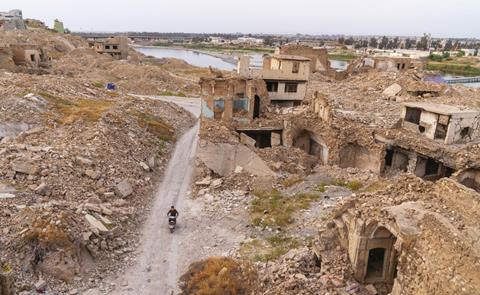
During the occupation of Nineveh, IS turned churches into torture and execution centres, bomb factories, shooting ranges and Jihadi training schools for children. Included among the many humiliations was the exhumation of the graves of priests and clergy, whose bodies were searched for gold and valuable items.
IS broke every cross, destroyed all the paintings and looted ancient sacred scriptures. According to reports, more than 30 churches inside Mosul city were converted, damaged or destroyed by IS before battles to retake the city began. Many of these were ancient buildings that embody the beginning of Christianity in Iraq. The Church of St Thomas the Apostle in the old city of Mosul, for example, is thought to be more than 1,500 years old, having been built on the site believed to be the house where the apostle lived during his stay in the city during the first Century.
Before 2003, more than 50,000 Christians - mostly from the Assyrian and Armenian ethnic groups - lived in Mosul. Today, only a few individuals from 70 families have returned to the city.
Father Emmanuel Kallo (pictured, below) pastors the Syriac-Catholic church, Al-Bishara (church of the Annunciation), in east Mosul
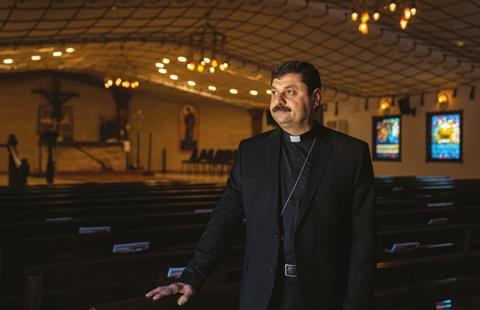
Fr Emmanuel was one of the first Christians to return to Mosul after it was liberated from IS in 2017. His church, and the surrounding parish, had been reduced to rubble. “When I first visited the church after the war, I found it collapsed,” he says. “As I looked at the rubble, I remembered the Sunday services when the church was filled with crowds and there were not enough seats for everyone.” Fr Emmanuel raised funds to reconstruct Al-Bishara, where he had pastored his flock for 15 years, and it officially reopened in 2019.
AL-BISHARA CHURCH IS A SYMBOL OF RESILIENCE TO MOSUL CHRISTIANS
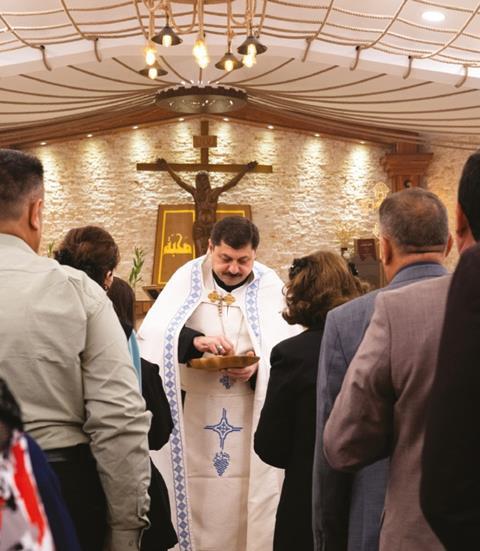
Youhana Yousif, 64, is currently living in Qaraqosh, Nineveh Plains
Youhana was forced to leave Mosul with his family in 2006 when al-Qaeda threatened to kidnap his sons unless they paid a ransom. He believes they were targeted for being Christians. “I still have my house in Mosul,” he says. “I would not sell or rent it because we were living with the hope of returning home one day. I believe if Christianity is lost from Mosul, it could easily be erased from the Nineveh Plains too, because this region’s Christian heritage and history began in Mosul, and that is why Mosul is our symbol [of religious freedom].” Since the day he was displaced, Youhana has returned to Mosul city every Sunday to attend the service at Al-Bishara Church. But he believes that assurances of safety will not be enough to encourage other Christians to return, many of whom have already lost hope and established a new life elsewhere. “If they return, there is a possibility that their lives will be destroyed again,” he says. “I wish that Christians from this city would keep their property and wait for the right conditions to return. It is unfortunate that in five years since the city was liberated, only 100 or so individuals have returned seeking their former jobs and to secure their properties, of whom very few are whole families.” He adds: “Fr Emmanuel’s return to Mosul has played a significant role in encouraging Christians to return to the city, and Al-Bishara Church is a symbol of resilience to Mosul Christians.”
Abu Omar (pictured below), 77, is a Sunni Muslim from the old city of Mosul
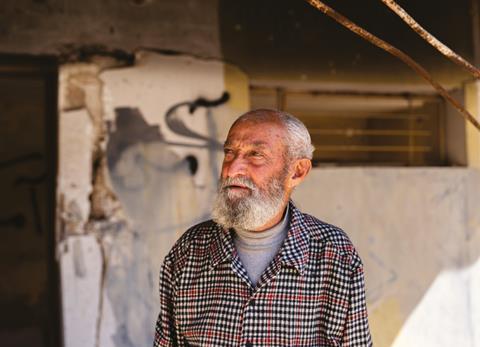
Abu remembers the days when Christians represented the majority of inhabitants in his neighbourhood. He is unhappy that he has lost so many of his Christian neighbours, who used to bring him coloured eggs and welcome him to church on Easter Sunday. He points to the ruins of his neighbourhood, where all the Christian houses remain collapsed. “Hanna, Butrus, Joseph, Mikhail, Fadila and Lasha were all good people, who are all in exile now,” he says. “I wish all the Christians would return to Mosul one day.”
Abu says he was happiest last year when Pope Francis prayed at Al-Bishara Church and he got the chance to see some of his Christian friends again: “We have lost our diversity, and living here does not feel the same without our Christian neighbours and childhood friends. It is even hard to tell it is Easter without having our beloved Christian friends here.”
LIVING HERE DOES NOT FEEL THE SAME WITHOUT OUR CHRISTIAN NEIGHBOURS
Eman Noel (pictured below centre), 49, from Mosul, is currently living in Erbil
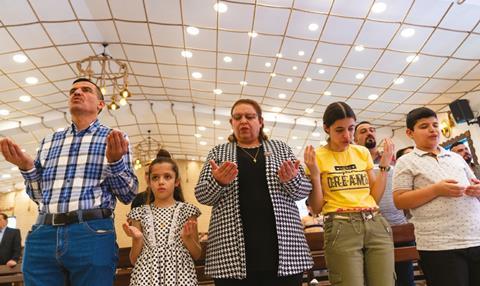
Eman fled Mosul with her husband and three children in 2014 afterIS attacked and threated the Christian population there. She travelled to Mosul with her family to attend Easter Sunday Mass this yearin their former church, Al-Bishara. Eman wants to attend every Sunday service in Mosul, but it’s challenging now that they have established a new life in Erbil. “The church used to be overcrowded on Easter,” she remembers. “Most Mosul Christians have resettled in other cities or are in exile due to all the previous threats and instability, and only very few have returned. We wish to return one day, but we do not have anything left to return to, except for our church.”
Sarah (alias), 66, from Mosul, is currently living in Erbil
In 2013, Islamic jihadists executed Sarah’s brotherin front of his children and wife and threatened to kill them, too, unless they left the city. “They killed my brother because he was the head of department in Al-Salam hospital,” she says. In 2003, al-Qaeda began to kidnap and execute Christians working in senior positions in public and private sector institutions because they believed it was haram (forbidden) for Muslims to be under the authority of non Muslims. “My memories of Easterin Mosul are not beautiful after 2003. Al-Qaeda prohibited church bell ringing and we did not dare to wear a cross or hang it on our vehicles because the jihadists killed and kidnapped people for that. We felt terrified attending Easter Masses in Mosul because of potential terrorist attacks and the mass killing of Christians.” Sarah remembers walking in the street with her twelve-year-old niece when they received a verbal warning from a stranger threatening to kill them if her niece wore a T-shirt again. “Neither al Qaeda nor IS were comprised of outsiders. They were our friends and neighbours who turned into extremists and turned against us. Foreign fighters did not exist back then but there were local informants on almost every corner of the street and at every workplace, who were cooperating with al-Qaeda to get Christians killed. The horror we lived is indescribable,” says Sarah. She now lives with her martyred brother’s family in Erbil, part of the autonomous Kurdistan region of Iraq where many Christians have relocated and churches remain full. None of them feels they can ever return to Mosul because of the painful memories associated with their former home. She says reintegration with the Muslim community of Mosul would be impossible now.
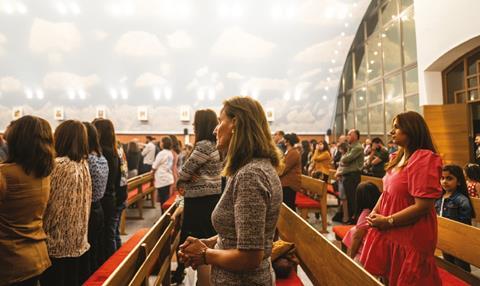
Deacon Nabil Al-Hindi from Mosul, is currently living in Duhok
Like Eman, Deacon Nabil longs to return to his life in Mosul with his family. However, after three years of displacement in Duhok, they have established new lives and moved their jobs, which makes the return more difficult. But he has been attending and serving at Al-Bishara Church every Sunday since it was rebuilt.
“When I first returned in 2017 it was extremely painful to see it destroyed. It had been only five days since my third kidney surgery and I decided to carry my cross and visit the church as soon as the city was liberated. The church is not only a building, but it is our existence; gathering here, like today, celebrating our faith in resurrection together.”
Restoring the Church in Iraq…one life at a time
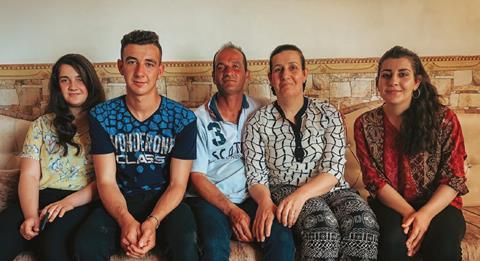
Haytham and his family fled Qaraqosh (near Mosul) with nothing when ISIS invaded, moving into a Help The Persecuted Safe House in Northern Iraq. Since that time, the charity has helped rebuild their home and provide a small business grant so Haytham could earn a living selling crops and farming fish.
Haytham and his family have been living examples in their community of the hope of Christ and vibrant members of the growing Church. Haytham’s son is now employed at Help The Persecuted’s Iraq Ministry Centre, serving others.
Visit go.htp.org/haytham to read the full story.





































